EXCERPT:
“George Welsh had more imagination in this game than ever before. He completely baffled Mississippi with his mixture of formations, plays and thinking.”
FULL ARTICLE:
NEW ORLEANS
The battle fought here in January 1815, in which Andy Jackson turned back the British, has been considered by many as one of the most significant in world history. But around these parts the thinking is changed now, some 140 years later. The thinking was changed New Year's Day when Navy defeated Mississippi in the Sug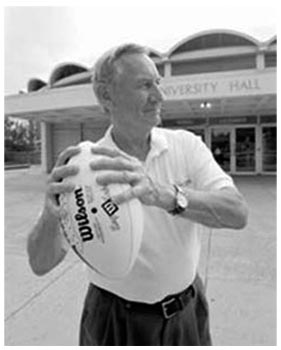 ar Bowl.
ar Bowl.
The Middies blocked and blockaded the Rebels just as effectively as did Admiral David Glasgow Farragut's flotilla here in 1862. Both forces captured New Orleans. Both hurt the prestige of the South. Thank goodness, Farragut was from Tennessee, and Annapolis is south of the Mason-Dixon Line.
Navy was beautifully prepared for this game—a tribute to the coaching of Eddie Erdelatz. The team could not expect to be "up" emotionally after their great victory over Army. Many felt this was a pleasure trip south for the holidays, and the general consensus in this section was that Navy was Ivy-bordered and could not compete with the best in the SEC.
I was with Eddie the night before the game. He was serenely confident, even approaching cockiness, and the Navy team in action bore out the assurance of its coach. Welsh had more imagination in this game than ever before. He completely baffled Mississippi with his mixture of formations, plays and thinking. If he ever lacked poise the Army game gave it to him—and remember, Colonel Blaik, he has another year.
Actually the 21-0 score does not indicate the one-sidedness of the game. From the opening kick-off Navy was dominant. George Welsh returned that kick-off from his 11 to the 30 and the drive was on. It persisted to the Ole Miss 12-yard line. Then a 15-yard penalty for illegal use of the hands set Navy back to the 27.
Welsh, on the option, pitched out to Left Halfback John Weaver who went to the Mississippi 3. From here Fullback Joe Gattuso slanted off tackle to his right for the touchdown. Weaver kicked the extra point and Navy was out front 7-0. The drive had consumed seven minutes and 30 seconds. Ole Miss had not even "come to bat" yet.
Mississippi ranked number one in the nation on defense and fifth in total offense, yet against Navy its defense was never adequate and not once could the Rebels put together a concerted drive. The huge Mississippi line (averaging 203 pounds from end to end) was consistently outcharged by the mobile Navy forwards despite the Middies' weight disadvantage of 18 pounds per man. The Rebel backs were big and fast but never managed to skirt or dent the Navy defenses. And speaking of defenses, Navy used 14 variations. Against these bewildering and tricky techniques the Mississippi attack was stagnant.
OFFICIALS DISAGREE
Nonetheless the half came with the score still just 7-0. Welsh set Halfback Weaver as a flanker to the right, then threw to Left End Ronnie Beagle who was in the end zone, but coming out of it, when he made a shoestring catch that came close to being a trapped ball. Field Judge Jimmy Hitchcock signaled a touchdown. Linesman Charles Wood, wh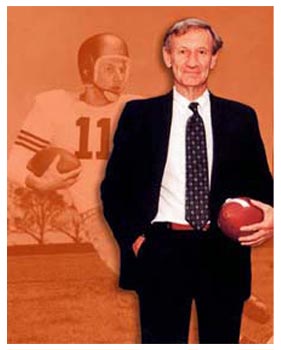 o was in a better position, ruled that while Beagle's feet were in the end zone he fell into the field of play when he caught the ball. The other officials agreed with the decision. Mississippi took over on the six-inch line and moved momentarily out of danger.
o was in a better position, ruled that while Beagle's feet were in the end zone he fell into the field of play when he caught the ball. The other officials agreed with the decision. Mississippi took over on the six-inch line and moved momentarily out of danger.
Navy took the second half kick-off and duplicated its opening performance. After Gattuso and Weaver had run through, around and over the helpless Mississippi defenses, Welsh dropped back and fired a pass to Weaver in the end zone, who simply took it away from three Rebel defenders. Shortly after, Eagle Day punted the longest distance that I've ever seen—a net of 72 yards. The ball ended up on the Navy seven. It looked as if Navy was in a deep hole, at last, down in the coffin corner. But the Midshipmen didn't know what trouble meant this day. They simply shredded the Ole Miss line. On the drive that followed, Gattuso bore the brunt of the attack. One of his plunges brought him from the Ole Miss 22 to the two-yard line (see opposite page). Then the Rebels stiffened momentarily. Twice Gattuso was stopped short but on the third try he went over. Weaver kicked his third extra point. The score was 21-0, and the ball game for all intents and purposes was over.
Whether Weaver or Gattuso was the greater in this game, I would hate to say, but enough of these backs. I'm an old guard and line coach and I saw a couple of unsung guards today put on just about the best display of guard play that I saw all season. Leonard Benzi at 180 pounds and Alexander Aronis at 183 were masters of all they surveyed. Their blocking was devastating and their defensive display was a joy to behold. But it would be unfair to single out just these two for praise.
This Navy line just might be the secret of its success. Patrick McCool filled in well for the injured Jim Royer at right tackle and John Hopkins has certainly come a long way this season. Wilson Whitmire at center was everywhere on the defense. And of course Ron Beagle and Bill Smith at ends, who, incidentally, are from Kentucky and Alabama respectively, did not treat their Mississippi neighbors like kissing cousins. They harried the Rebel passers all afternoon and blocked opposing tackles as if they owned them.
This may sound like a one-sided story but that's the way the game was. It was fitting that a team called desire showed them in New Orleans what desire really meant.
Source: http://www.si.com/vault/1955/01/10/553983/navy-21-mississippi-0

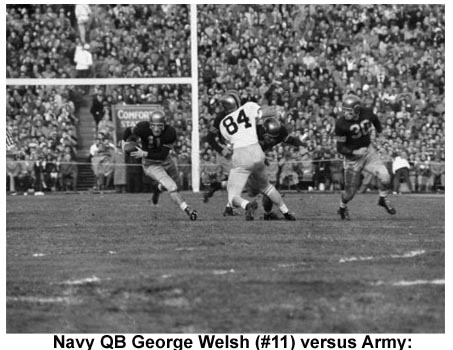
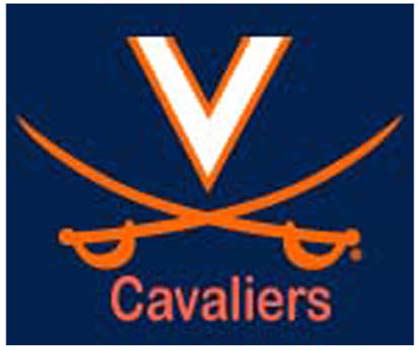
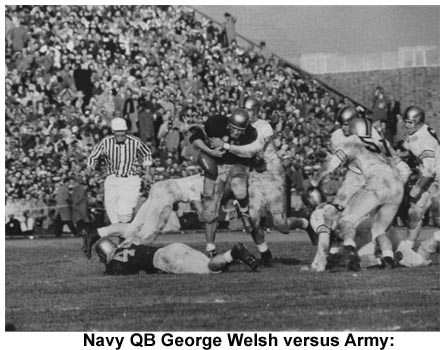
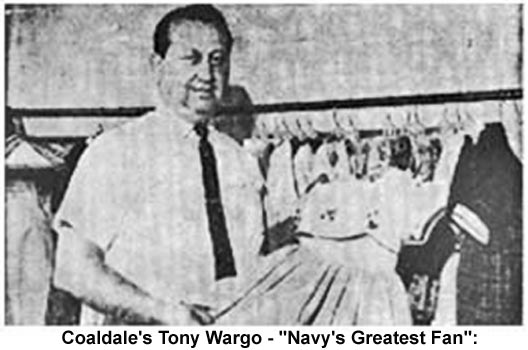
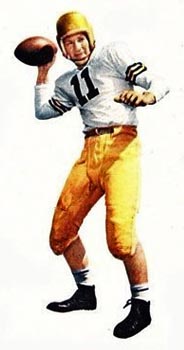
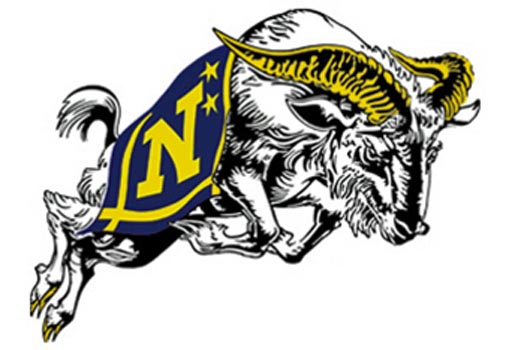
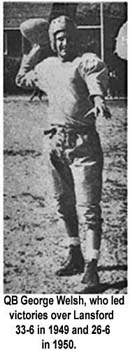
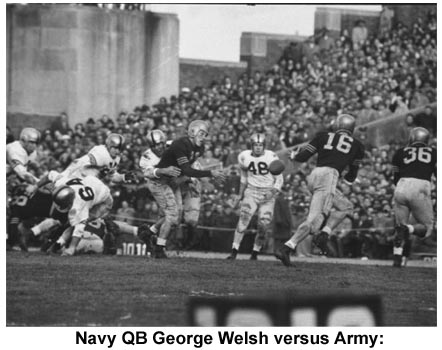
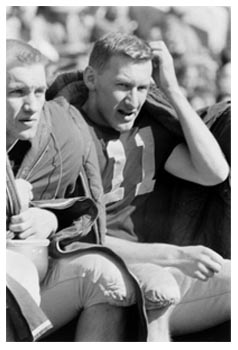
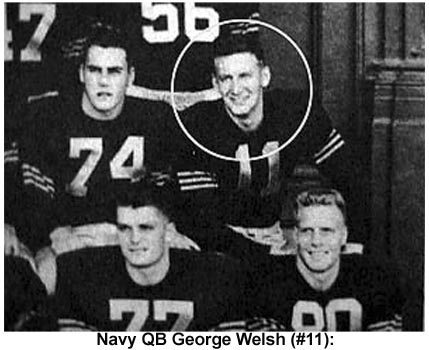
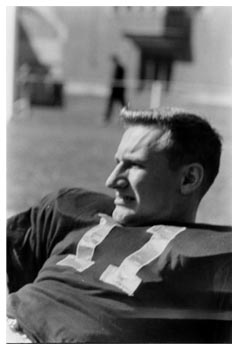
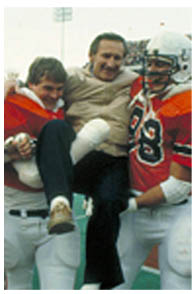

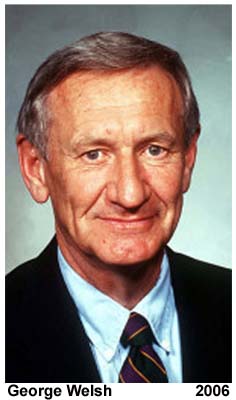 The 2007 tournament appearance will mark the first time the United States has competed in a world championship event in the sport of football. The tournament, which is run by the International Federation of American Football (IFAF), was previously held in 1999 in Italy and 2003 in Germany.
The 2007 tournament appearance will mark the first time the United States has competed in a world championship event in the sport of football. The tournament, which is run by the International Federation of American Football (IFAF), was previously held in 1999 in Italy and 2003 in Germany.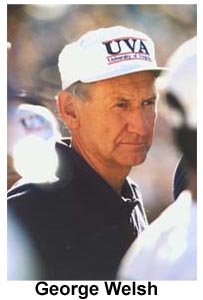 ll qualify for the championship through play-in tournaments in Europe, Asia and the South Pacific later this year.
ll qualify for the championship through play-in tournaments in Europe, Asia and the South Pacific later this year. ar Bowl.
ar Bowl. o was in a better position, ruled that while Beagle's feet were in the end zone he fell into the field of play when he caught the ball. The other officials agreed with the decision. Mississippi took over on the six-inch line and moved momentarily out of danger.
o was in a better position, ruled that while Beagle's feet were in the end zone he fell into the field of play when he caught the ball. The other officials agreed with the decision. Mississippi took over on the six-inch line and moved momentarily out of danger.